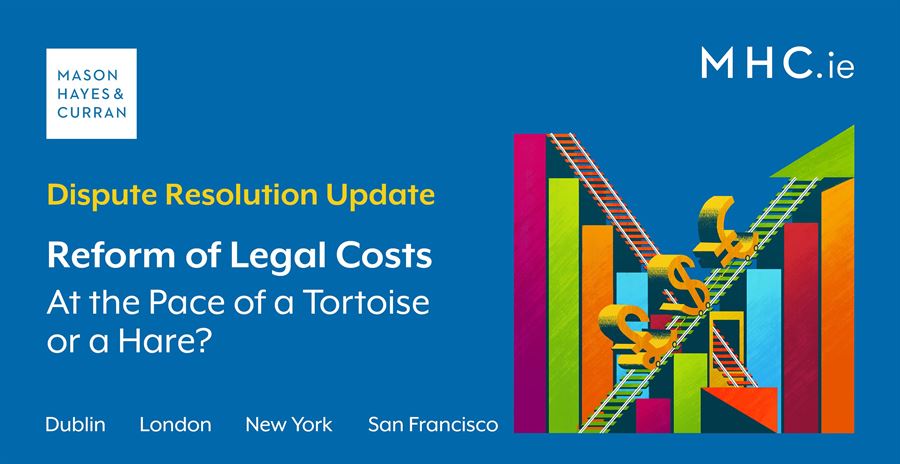
In February, the High Court found that the legal costs involved in establishing who owned a sum of €228,000, could ultimately amount to over €500,000. As Mr Justice Twomey commented, the case “highlights both the high level and the disproportionate level of legal costs in the High Court today and why the Civil Justice Review has called for the reform of legal costs”.[1]
The Review Group, which authored the recent “Review of the Administration of Civil Justice Report” recommended the introduction of:
-
Non-binding legal cost guidelines
-
A requirement that a bill of costs be provided within three months of the court order awarding costs or ruling a settlement in which liability for costs has been agreed, and
-
Third party funding for liquidators, receivers, administrators, the Official Assignee or trustees in bankruptcy to fund certain proceedings
The recommendations
Non-binding legal cost guidelines
Following initiatives in Canada and Australia, the recommended guidelines are intended to help parties and their representatives by reference to a table of individual legal actions and their corresponding cost. However, the Review Group could not reach agreement on this issue. The majority were in favour of “non-binding” guidelines with the minority recommending prescribed maximum cost levels.
While guidelines would introduce more transparency and certainty for clients, it remains to be seen whether they will make an impact in practice given their non-binding status.
Bill of costs within three months of the court order for costs
The introduction of this time limit, with penalties for non-compliance, would require amendment to legislation. However, it is a simple step that could have a direct impact on bringing finality for clients and the other parties to litigation. This is because issues relating to the quantification and payment of costs can sometimes linger for months after legal proceedings have concluded.
Third party funding for liquidators, receivers, administrators, the Official Assignee or trustees in bankruptcy to fund certain proceedings
If introduced, this mechanism will be welcome news for creditors. Third party litigation funding in Ireland is currently not permitted as a result of age old laws prohibiting champerty and maintenance. The Review Group saw merit in allowing limited funding of proceedings taken by insolvency practitioners, with the purpose of increasing the pool of assets available to those who are owed money. While it is disappointing that this recommendation was not widened to the scope of litigation funding permitted in the U.K., the Group confined its scope on this aspect. This was done due to the pending completion of the Law Reform Commission’s examination of third party litigation funding generally.
Conclusion
The recommendations should generally be welcome news for individuals and companies doing business in Ireland. The cost of litigation influences the cost of doing business, as well as the prices for goods and services. Internationally, the high costs of litigation in Ireland could be seen to impact the strength of the rule of law in this jurisdiction and our capacity to attract domestic and foreign investment.
The real work will lie in transposing the recommendations from paper into practice. However, Minister for Justice, Helen McEntee has openly committed, in her department’s “Justice Plan”, to introduce new scales of legal costs. The Minister has also committed to examining “the recommendations contained within the Peter Kelly report on legal costs including making such scales binding, except where both parties agree to opt out”. We await the results of this examination, which is expected to conclude by Q4 of this year.
The Report in full can be accessed here.
For more information, contact a member of our Dispute Resolution team.
The content of this article is provided for information purposes only and does not constitute legal or other advice.
[1] Tom McEvaddy Property Limited t/a Nexus Homes (in liquidation) v National Asset Loan Management DAC (No.2) [2021] IEHC 125.
Share this:





